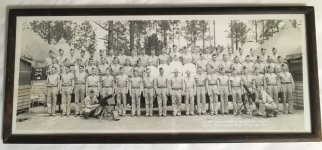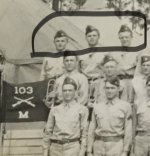Join the Hide community
Get access to live stream, lessons, the post exchange, and chat with other snipers.
Register
Download Gravity Ballistics
Get help to accurately calculate and scope your sniper rifle using real shooting data.

Install the app
How to install the app on iOS
Follow along with the video below to see how to install our site as a web app on your home screen.
Note: This feature may not be available in some browsers.
-
Quick Shot Challenge: What’s the most underrated gear you never leave home without?
Contest ends Wednesday, join now for the chance to win free Hide merch!
Join contest
You are using an out of date browser. It may not display this or other websites correctly.
You should upgrade or use an alternative browser.
You should upgrade or use an alternative browser.
Thank you.
- Thread starter Maggot
- Start date
In less than one year, my Father’s Brother 10th Mountain would be killed in Italy by retreating Germans. (On the Day Hitler killed himself)
My father would be wounded in battle, fighting the “Japs” while his other Brother remained in the S. Pacific.
They gave so much for us. Knowing these men that survived, was the greatest honor of my life.
When my father passed at 94, I asked for one thing. The photo below.


My father would be wounded in battle, fighting the “Japs” while his other Brother remained in the S. Pacific.
They gave so much for us. Knowing these men that survived, was the greatest honor of my life.
When my father passed at 94, I asked for one thing. The photo below.


The old man was a pilot so he didnt get drafted, he went into the MATS (military air transport service) flying supplies to Europe over the north Atlantic. Unescorted, no protection from the Luftwaffe. Other than "I was lucky, didnt get shot down." he never said much.
I miss that old boy, learned a lot from him. RIP pop and all of you.
I miss that old boy, learned a lot from him. RIP pop and all of you.
One of the welthiest men in the world insisted on being in the first wave. Talk about dedication. I had seen this before but it seems more powerful today when the wealthy sit back and are more than happy to send others to die for them.
On this day, 81 years ago, on June 6, 1944, Brigadier General Theodore Roosevelt Jr., age 56, landed with the first wave of infantry on Utah Beach during the Allied invasion of Normandy.
Roosevelt was the assistant division commander of the 4th Infantry Division. He suffered from arthritis and had a heart condition. He walked with a cane. Despite this, he personally requested to go ashore with the first wave of troops. His request was approved.
When Roosevelt landed, he immediately realized that the landing craft had drifted nearly 2,000 yards south of their assigned beach. The units were scattered. The beach was under fire. Shells landed nearby. German machine guns swept the shoreline. Officers and men were disoriented. Command structure was breaking down.
Roosevelt made a decision. He walked up and down the beach under fire. He located commanders. He assessed the terrain. He determined the new location could still support the mission. He ordered the troops to press forward from that point. He said, “We’ll start the war from right here.”
Throughout the morning and afternoon, Roosevelt moved across the sand and the sea wall, personally directing units, grouping scattered soldiers, and assigning objectives. He organized columns and pointed them toward exits from the beach. He made contact with naval gunfire units and adjusted fire on enemy positions inland.
He repeatedly exposed himself to enemy fire while moving between positions. He brought up reinforcements and guided them through minefields and along cleared paths. At multiple points, he led troops directly through enemy zones to ensure progress inland. His leadership stabilized the beachhead and enabled the division to achieve its initial objectives with fewer casualties than expected.
Roosevelt remained on the beach all day. He never sought cover. He refused to rest. He coordinated with both division staff and regimental units as they established a foothold in enemy territory.
One month later, on July 12, 1944, while serving in France, Roosevelt died of a heart attack. He was buried at the Normandy American Cemetery. His grave lies next to that of his younger brother Quentin Roosevelt, a pilot killed in World War I.
For his actions on June 6, 1944, Brigadier General Theodore Roosevelt Jr. was posthumously awarded the Medal of Honor.

On this day, 81 years ago, on June 6, 1944, Brigadier General Theodore Roosevelt Jr., age 56, landed with the first wave of infantry on Utah Beach during the Allied invasion of Normandy.
Roosevelt was the assistant division commander of the 4th Infantry Division. He suffered from arthritis and had a heart condition. He walked with a cane. Despite this, he personally requested to go ashore with the first wave of troops. His request was approved.
When Roosevelt landed, he immediately realized that the landing craft had drifted nearly 2,000 yards south of their assigned beach. The units were scattered. The beach was under fire. Shells landed nearby. German machine guns swept the shoreline. Officers and men were disoriented. Command structure was breaking down.
Roosevelt made a decision. He walked up and down the beach under fire. He located commanders. He assessed the terrain. He determined the new location could still support the mission. He ordered the troops to press forward from that point. He said, “We’ll start the war from right here.”
Throughout the morning and afternoon, Roosevelt moved across the sand and the sea wall, personally directing units, grouping scattered soldiers, and assigning objectives. He organized columns and pointed them toward exits from the beach. He made contact with naval gunfire units and adjusted fire on enemy positions inland.
He repeatedly exposed himself to enemy fire while moving between positions. He brought up reinforcements and guided them through minefields and along cleared paths. At multiple points, he led troops directly through enemy zones to ensure progress inland. His leadership stabilized the beachhead and enabled the division to achieve its initial objectives with fewer casualties than expected.
Roosevelt remained on the beach all day. He never sought cover. He refused to rest. He coordinated with both division staff and regimental units as they established a foothold in enemy territory.
One month later, on July 12, 1944, while serving in France, Roosevelt died of a heart attack. He was buried at the Normandy American Cemetery. His grave lies next to that of his younger brother Quentin Roosevelt, a pilot killed in World War I.
For his actions on June 6, 1944, Brigadier General Theodore Roosevelt Jr. was posthumously awarded the Medal of Honor.
Some of the bravest without doubt.Bravest men to ever walk the Earth
Imagine what must have gone through his mind. Twice.
My wife's father, Charley was in the 9th USAAF 410th Light Bomber Group 646th Squadron and served in Europe, starting in France. Because he spoke and understood German (family history has both sides of the big family immigrating from Germany on the same boat in 1850 and settling in and around Washington County, Texas,) and he worked in the mess hall, he would be in charge of giving camp work assignments to the German POWs. Most of those were 17 to 19 year olds, answering the call of their country.
He came back home in 1945. Built house and married his high school sweetheart in 1947. My wife was born 1955 and her brother was born in 1957. They grew up in Brenham, though she was technically born in Austin. Her father had worked for the city. Then, later, he worked for LCRA (Lower Colorado River Authority) as a lineman electrician and building transformer racks on poles. For years, he could tell by look at a pole what the voltage and power capabilities were.
He passed away in 2014 at the age of 90, almost 91. He was buried in Brenham with military honors.
He came back home in 1945. Built house and married his high school sweetheart in 1947. My wife was born 1955 and her brother was born in 1957. They grew up in Brenham, though she was technically born in Austin. Her father had worked for the city. Then, later, he worked for LCRA (Lower Colorado River Authority) as a lineman electrician and building transformer racks on poles. For years, he could tell by look at a pole what the voltage and power capabilities were.
He passed away in 2014 at the age of 90, almost 91. He was buried in Brenham with military honors.
Fucking BIG brass balls!One of the welthiest men in the world insisted on being in the first wave. Talk about dedication. I had seen this before but it seems more powerful today when the wealthy sit back and are more than happy to send others to die for them.
On this day, 81 years ago, on June 6, 1944, Brigadier General Theodore Roosevelt Jr., age 56, landed with the first wave of infantry on Utah Beach during the Allied invasion of Normandy.
Roosevelt was the assistant division commander of the 4th Infantry Division. He suffered from arthritis and had a heart condition. He walked with a cane. Despite this, he personally requested to go ashore with the first wave of troops. His request was approved.
When Roosevelt landed, he immediately realized that the landing craft had drifted nearly 2,000 yards south of their assigned beach. The units were scattered. The beach was under fire. Shells landed nearby. German machine guns swept the shoreline. Officers and men were disoriented. Command structure was breaking down.
Roosevelt made a decision. He walked up and down the beach under fire. He located commanders. He assessed the terrain. He determined the new location could still support the mission. He ordered the troops to press forward from that point. He said, “We’ll start the war from right here.”
Throughout the morning and afternoon, Roosevelt moved across the sand and the sea wall, personally directing units, grouping scattered soldiers, and assigning objectives. He organized columns and pointed them toward exits from the beach. He made contact with naval gunfire units and adjusted fire on enemy positions inland.
He repeatedly exposed himself to enemy fire while moving between positions. He brought up reinforcements and guided them through minefields and along cleared paths. At multiple points, he led troops directly through enemy zones to ensure progress inland. His leadership stabilized the beachhead and enabled the division to achieve its initial objectives with fewer casualties than expected.
Roosevelt remained on the beach all day. He never sought cover. He refused to rest. He coordinated with both division staff and regimental units as they established a foothold in enemy territory.
One month later, on July 12, 1944, while serving in France, Roosevelt died of a heart attack. He was buried at the Normandy American Cemetery. His grave lies next to that of his younger brother Quentin Roosevelt, a pilot killed in World War I.
For his actions on June 6, 1944, Brigadier General Theodore Roosevelt Jr. was posthumously awarded the Medal of Honor.
View attachment 8703339
That's why he needed a cane to walk.Fucking BIG brass balls!
My uncle Howard Tucker served in 3 wars WW2 ,Korea and Vietnam, 30yrs iirc in the Navy.
I know/ have known so many from that era, they did their job, they did their life, they did and they are.
The country these Heroes fought and died for has completely gone to shit. Trans shit, pride month, fucked up crooked politician s. What the every lovin hell happened. Depressing
Similar threads
- Replies
- 27
- Views
- 968
